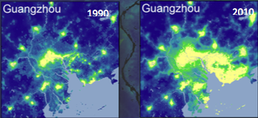Seminar 1st December 2015 11 a.m. 176/2013
Mapping population distributions and dynamics: WorldPop and Flowminder
Prof Andy Tatem
University of Southampton
- Categories
- NGCM
- Submitter
- Susanne Ufermann Fangohr
Summary
An understanding of the numbers, characteristics and locations of human populations underpins operational work, policy analyses and scientific development globally across multiple sectors. However, traditional population data sources are often outdated, have low granularity and are updated on the scale of decades. New data sources and recent methodological advances made by the WorldPop program now provide high resolution, open and contemporary data on human population distributions, allowing accurate measurement of local population distributions, compositions, characteristics and growth, across national and regional scales.
The WorldPop population mapping program is constructed based on academically peer-reviewed methodologies and currently provides the spatial demographic datasets of choice for 100+ government agencies. Datasets have been downloaded and used by researchers and policy makers based in governments of every low- income and lower-middle income country in Africa and Asia, supporting development, health and planning. Moreover, WorldPop data are used by many international agencies, including the International Red Cross, Bill and Melinda Gates Foundation, UN-FAO, UNDP, UNFPA, UNOCHA, CDC, China CDC, WFP, WWF, MSF, iMMAP, NASA, Population Council, Clinton Health Access Initiative, DFID, USGS, AidData and MapAction.
Bio
Andy is a Professor of spatial demography and epidemiology in the department of geography and environment at the University of Southampton. He is also director of the WorldPop project (www.worldpop.org) and Flowminder Foundation (www.flowminder.org), focussed on supporting low and middle income countries in improving their demographic evidence bases, responding to humanitarian crises and supporting disease control strategy design. Through these projects he leads partnerships with UN-OCHA, UNFPA, the World Food Program, World Bank and multiple disease control programs, statistical agencies and mobile phone network operators around the world. Andy has published over 120 peer-reviewed articles, including many in Nature, Science and the Lancet, and serves on multiple expert advisory panels on demography and epidemiology. He currently leads projects totalling over £10 million funded by the Bill and Melinda Gates Foundation, Clinton Health Access Initiative, UN Foundation, NORAD, USAID, Microsoft, Google, Rockefeller Foundation, World Bank and National Institutes of Health, and manages a group of 30 researchers at Southampton.
